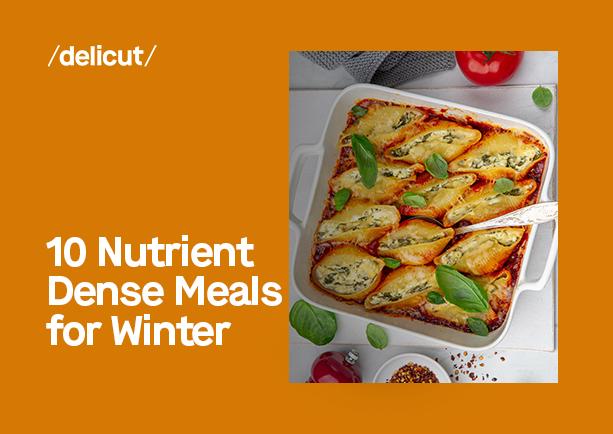10 Nutrient Dense Meals for Winter

As winter sets in, our bodies crave warmth and nourishment to combat the chilly weather and bolster our immune systems. This season, it's essential to focus on nutrient-dense meals that provide comfort and pack a punch of vitamins, minerals, and energy to keep us healthy and energized.
Winter offers a bounty of seasonal produce and ingredients that can be transformed into hearty, wholesome dishes.
In this blog, we'll explore 10 nutrient-rich meal ideas perfect for the winter months. These recipes are designed to warm you from the inside out, ensuring that your winter diet is both comforting and beneficial to your overall well-being.
The Importance of Nutrient-Dense Foods in Winter
During winter, the body's nutritional needs shift, emphasizing the importance of consuming nutrient-dense foods. The colder months often bring challenges such as decreased exposure to sunlight, leading to lower levels of vitamin D, and a higher propensity for infections, necessitating a stronger immune response.
Nutrient-dense foods are rich in vitamins, minerals, antioxidants, and other essential nutrients that fortify the immune system, help maintain energy levels, and support overall health.
In winter, the body also expends more energy to stay warm, increasing the demand for high-calorie, nutrient-dense foods. Incorporating a variety of fruits, vegetables, whole grains, lean proteins, and healthy fats into your diet can provide the necessary calories and nutrients without excessive intake of unhealthy fats or sugars.
10 Nutrient-Dense Winter Meal Ideas
Each of these meals is designed to provide a balance of essential nutrients, keeping you nourished and energized during the winter months.
1. Hearty Vegetable Soup:
A warm bowl of vegetable soup is perfect for cold winter days. Simmer a mix of seasonal vegetables like carrots, potatoes, and celery in a rich vegetable broth. Add leafy greens such as spinach or kale for an extra nutrient boost. This soup is not only comforting but also packed with vitamins and minerals.
2. Roasted Root Vegetable Salad:
Toss root vegetables like beets, carrots, and parsnips in olive oil and roast until tender. Serve over a bed of mixed greens and top with a balsamic vinaigrette. This salad is rich in fiber and antioxidants, ideal for a nutritious winter lunch.
3. Lentil and Kale Stew:
Cook lentils with onions, garlic, and diced tomatoes, then add chopped kale. Season with herbs for a hearty and satisfying stew, full of iron and protein from the lentils and vitamin K from the kale.
4. Butternut Squash and Quinoa Pilaf:
Combine roasted butternut squash with cooked quinoa, cranberries, and walnuts. This pilaf is a wholesome blend of complex carbs, healthy fats, and essential nutrients.
5. Beef and Barley Soup:
Prepare a nourishing soup with chunks of beef, barley, and vegetables like carrots and peas. This protein-rich soup is perfect for staying warm and satiated.
6. Baked Salmon with Winter Vegetables:
Bake salmon fillets with a medley of winter vegetables like Brussels sprouts and sweet potatoes. Salmon is an excellent source of omega-3 fatty acids, crucial for heart health.
7. Chicken and Sweet Potato Curry:
Create a warming curry with chicken, sweet potatoes, and coconut milk. Serve with brown rice for a comforting meal rich in protein and beta-carotene.
8. Spinach and Ricotta Stuffed Shells:
Stuff pasta shells with a mixture of ricotta cheese, spinach, and herbs. Bake in a tomato sauce for a calcium-rich, comforting dish.
9. Turkey Chili with Beans:
Simmer ground turkey with kidney beans, tomatoes, and chili spices. This chili is high in protein and fiber, making it both filling and heart-healthy.
10. Roasted Brussels Sprouts and Pomegranate Salad:
Roast Brussels sprouts until caramelized and toss with pomegranate seeds, nuts, and a light dressing. This salad is a delightful combination of flavors and is packed with vitamins and antioxidants.
Tips for Creating Nutrient-Dense Winter Meals
Creating nutrient-dense meals in winter is all about choosing the right ingredients and cooking methods. Start by incorporating a variety of seasonal produce like squash, root vegetables, dark leafy greens, and citrus fruits, which are fresh and flavorful, and packed with vitamins and minerals.
Opt for whole grains like quinoa, barley, and brown rice, as they provide sustained energy and are excellent sources of fiber.
Include lean proteins such as poultry, fish, beans, and lentils to enhance the nutritional value of your meals. Don’t forget healthy fats from sources like nuts, seeds, avocados, and olive oil, which are essential for absorbing fat-soluble vitamins.
Cooking methods like roasting, stewing, and baking can intensify flavors and preserve nutrients. Lastly, season your dishes with herbs and spices instead of excess salt to boost both taste and health benefits.
Conclusion
The 10 nutrient-dense meal ideas presented offer a roadmap to hearty, healthful eating during the colder months. These meals are thoughtfully designed to harness the best of seasonal produce, combining them with wholesome grains, lean proteins, and healthy fats to create dishes that nourish and satisfy.
As you experiment with these meal ideas, remember that winter cooking can be both a joy and a journey toward better health. These nutrient-packed dishes are more than just food; they're a warm embrace on a cold day, fueling your body and uplifting your spirits. So, dive into these recipes and let each bite bring a little more warmth and wellness to your winter days.
FAQs
1. What are the top 10 nutrient-dense meals ideal for winter?
Hearty Vegetable Soup: Rich in vitamins from a variety of vegetables.
Roasted Root Vegetable Salad: Packed with fiber and antioxidants.
Lentil and Kale Stew: High in iron and vitamins A and C.
Butternut Squash and Quinoa Pilaf: Offers a good mix of complex carbs and protein.
Beef and Barley Soup: Rich in protein and fiber.
Baked Salmon with Winter Vegetables: High in omega-3 fatty acids and essential vitamins.
Chicken and Sweet Potato Curry: Provides protein and beta-carotene.
Spinach and Ricotta Stuffed Shells: Offers calcium and iron.
Turkey Chili with Beans: Rich in protein and fiber.
Roasted Brussels Sprouts and Pomegranate Salad: High in vitamins C and K, and antioxidants.
2. How do these meals help in boosting immunity during the winter season?
These meals are rich in nutrients like vitamins A, C, and E, as well as minerals like iron and zinc, which are crucial for strengthening the immune system. The inclusion of a variety of vegetables and lean proteins ensures a robust supply of essential nutrients needed for immunity.
2. Are there vegetarian or vegan options among these nutrient-dense winter meals?
Many of these meals have vegetarian or vegan alternatives. For instance, lentil stew, quinoa pilaf, and vegetable soups can be prepared without any animal products, still offering high nutritional value.
3. Can these nutrient-dense meals be prepared using easily available winter ingredients?
These meals are designed to utilize ingredients that are readily available during winter. Root vegetables, winter greens, and stored produce like squashes and potatoes are the stars of these dishes, ensuring they can be prepared with ease during the colder months.
4. How do these meals ensure a balanced intake of vitamins and minerals in the colder months?
By incorporating a diverse range of vegetables, grains, and proteins, these meals ensure a balanced intake of essential nutrients. They provide a mix of macronutrients (proteins, fats, carbohydrates) and a wide array of micronutrients (vitamins and minerals), catering to the body's increased needs in winter for energy, immune support, and overall health maintenance.
Read More :
30 Day Paleo Diet Meal Plan Easy Recipes
5 Healthy Vegetarian Diet plan ideas
7 Day 1500 Calorie Meal Plan Ideas recipes
Related Blogs
The Burnout Diet
Jan 30, 2026 | 8The mental load of “What should I eat today?"
Jan 22, 2026 | 8The real glow-up starts with your gut health
Jan 14, 2026 | 8Healthy food that doesn’t taste like “Diet Food”
Jan 17, 2026 | 8Why do most people in the UAE get their calories wrong
Dec 8, 2025 | 6DASH Diet Meal Plan
Nov 11, 2025 | 8Fatty Liver Meal Plan
Oct 31, 2025 | 8Pregnancy Diet Meal Plan
Oct 27, 2025 | 82000 Calorie Meal Plan
Oct 1, 2025 | 8Intermittent Fasting Diet Plan
Sep 5, 2025 | 8






